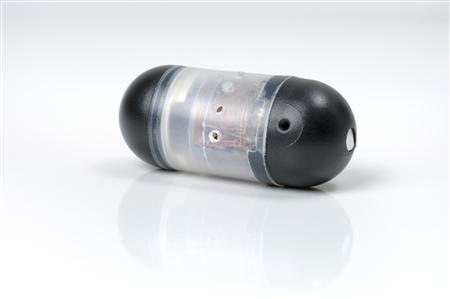
|

|
| Previous Issue |
|
|
| Current Better Health News Topics |
|
|
|
It's important to keep up with the medical news that affects your health and well-being. CanDrugstore is committed to providing you with up-to-date information regarding those issues that might be affecting your health. Keep reading this month’s Better Health News to find out more!
You can also submit any feedback you may have to
[email protected]
Have you heard about our LIFETIME SHIPPING option?
Inquire today to save on your prescription orders!
|
|
'Smart Pills' Are on Their Way
 The “smart-pill” is a silicon and metal digestible tablet with a sensor in it. The pill is activated by stomach acid after being ingested and it is able to transmit data using wireless or Blue-tooth connections to a patch worn by the patient. From there the data is sent to a doctor’s smart phone or computer.
The “smart-pill” is a silicon and metal digestible tablet with a sensor in it. The pill is activated by stomach acid after being ingested and it is able to transmit data using wireless or Blue-tooth connections to a patch worn by the patient. From there the data is sent to a doctor’s smart phone or computer.
Novartis is using this technology on a drug that has already been approved. This drug is used to prevent organ rejection in transplant patients. Novartis is attempting to incorporate this sensor-based technology into other medications, such as medication for cardiovascular problems, and medication for tumors.
It is anticipated that once the sensor-based technology is approved, the Smart Pill will be used in an even greater variety of medication. In the future, variations on the Smart Pill will be able to collect data on a patient instead of just helping to treat already known problems. The Smart Pill will be able to collect data on the patient’s heart rate, body movement and temperature. Being able to collect information like this will also allow the pill to tell how well a drug is working.
The company spent 24 million dollars on exclusive worldwide rights to using sensor-based technology. There is plenty of fierce competition to bring an “intelligent” drug to the market. A company known as Philips is still working on the “IntelliCap” which was first showcased in 2008.
|
|
|
International Travel - A Risk to Your Health?
 More than 30 million people in the United States travel to
third world countires every year. With this many people traveling to so many different places, infectious diseases are spreading much more rapidly. The
spread of diseases such as influenza, measles, and meningitis pose a great risk to people traveling to
these areas. Travelling to impoverished
nations may also put individuals at risk of malaria, typhoid, dengue fever and hepatitis. Although these risks are well known, a recent study conducted by the Division of Infectious Diseases at the Massachusetts General Hospital showed that 46% of
those who travel to less developed countries did not seek any health advice or vaccinations before they left. More than 30 million people in the United States travel to
third world countires every year. With this many people traveling to so many different places, infectious diseases are spreading much more rapidly. The
spread of diseases such as influenza, measles, and meningitis pose a great risk to people traveling to
these areas. Travelling to impoverished
nations may also put individuals at risk of malaria, typhoid, dengue fever and hepatitis. Although these risks are well known, a recent study conducted by the Division of Infectious Diseases at the Massachusetts General Hospital showed that 46% of
those who travel to less developed countries did not seek any health advice or vaccinations before they left.
More than 1,200 international travelers were surveyed at the Boston Logan International Airport in the United States.
Of those 1,200 partipants, 38% were traveling to countries described as low income by the World Bank’s World Development Report.
Of that group, 46% of those travelling to low income nations did not seek health advice before they left. Foreign-born
travelers were least likely to have done any research, and did not pursue any health information because there was a lack of concern for possible health problems.
Of the those travelers who performed research prior to their trip, the most common source used was the Internet, followed by the primary care practitioners. These results show that the Internet and the primary care practitioners are likely to be the optimal way of distributing information on safe traveling. International travel is the most common way infections are spread throughout the world. People typically do not realize that by not researching thes possible health risks before traveling, they put themselves at risk, and also put their community in danger when they return home.
Some examples of spread in disease include SARS, Dengue fever, and Chikungunya.
- SARS is an Abbreviation for Severe Acute Respiratory Syndrome and it caused a global epidemic in the years 2002-2003.
- Dengue fever is a tropical disease normally found in the Caribbean, Latin America and Asia; however, it has been reported to be found in the southern United States.
- Chikungunya is a viral infection where the victims experience fever, headaches, weakness and joint pain. Chikungunya is normally found in India but has been spread to Italy by
Travelers.
|
|
How to Save at the Pharmacy
 The growing cost of pharmaceuticals is making it very difficult for the average person to obtain medication. For those with chronic health conditions the costs of medication can become overwhelming. However, there are number of ways in which these substantial costs can be significantly reduced. The growing cost of pharmaceuticals is making it very difficult for the average person to obtain medication. For those with chronic health conditions the costs of medication can become overwhelming. However, there are number of ways in which these substantial costs can be significantly reduced.
• Buy Generic Drugs: Purchasing generic drugs instead of their brand name counterparts can result in saving hundreds of dollars a month. Generic drugs are essentially the same as their brand name versions. They contain the same active ingredient but look different. The only reason generics are more cost-friendly is because far less money needs to go into the research and development of the drug in comparison to the brand name.
• Ask for Samples: Most doctors and pharmacists have samples of drugs. It can be very beneficial to ask for a sample from your doctor before actually purchasing the medication in a larger quantity. This way you will know how your body reacts to the medication and save money at the same time.
• Special Offers: Keep your eyes open for any promotions that your pharmacy has. In addition, most pharmacies usually have some sort of rewards program. For example, for every dollar you spend you could be gaining points which can later be redeemed. Although these savings may not seem significant at first, over time they will prove to have been worth it.
• Buy Larger Quantities: Purchasing your medication in larger amounts can also save you quite a bit of money. You are legally able to get a three month supply at once. By purchasing a three month supply of your medication you can save on shipping fees, since you will be paying only one shipping fee for the three months. You can also save money by purchasing your entire families medications all at once. This will eliminate even more shipping costs.
Using the tips listed above will definitely help
cut costs. However, one cannot neglect that even
after taking all these measures the cost of
medication will still be quite high. It is
important to never let the cost of medication take
precedence over your health.
|
|
Vitamin D and the Common Cold
 As winter is fast approaching, we will be seeing less sunlight. As a result we will no longer be receiving a natural source of Vitamin D as we did in the summer. It is important that people have their supplemental Vitamin D3 and 25-hydroxy Vitamin D.
As winter is fast approaching, we will be seeing less sunlight. As a result we will no longer be receiving a natural source of Vitamin D as we did in the summer. It is important that people have their supplemental Vitamin D3 and 25-hydroxy Vitamin D.
Approximately 85% of Americans have Vitamin D deficiency during wintertime. The average level of Vitamin D is only about 17ng/ml. This is significantly lower than the optimal level of Vitamin D which is approximately 50- 65 ng/ml.
Many studies have been conducted and it has been made clear that Vitamin D plays an important role in the risk of contracting the common cold. It has been found that those with low levels of Vitamin D are more prone to
getting a cold, while those who take Vitamin D supplements regularly are at a lower risk of contracting a cold.
In addition, it was found that people with chronic respiratory disorders (e.g. asthma) displayed a higher risk of getting the common cold in comparison to someone without a respiratory disorder. This makes it even more important for these select individuals to maintain an optimal level of Vitamin D.
In the event that you catch the common cold, experts recommend taking the doses of Vitamin C and D for five and three days respectively and continuing maintenance doses all year.
|
|
|
|
|
|

